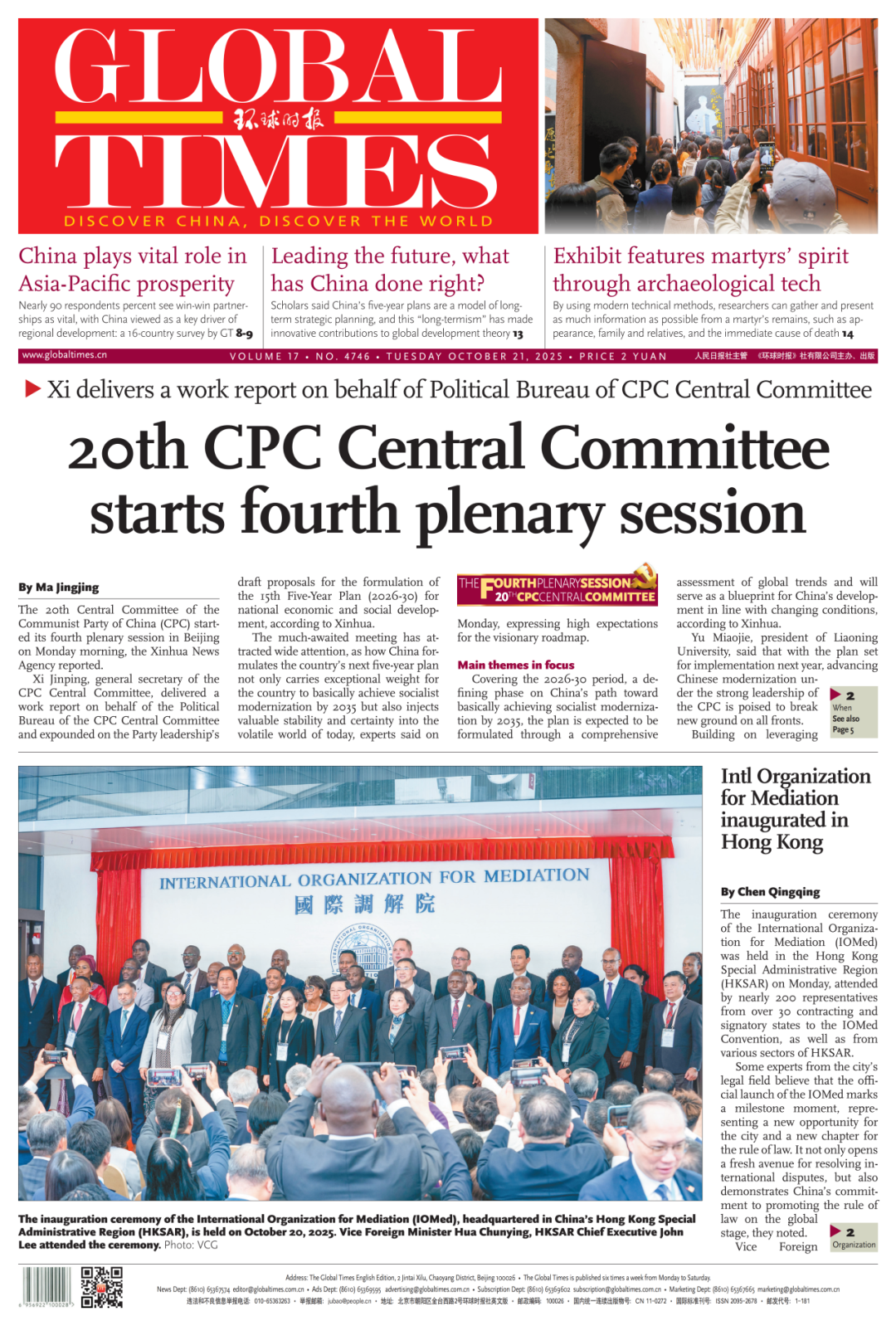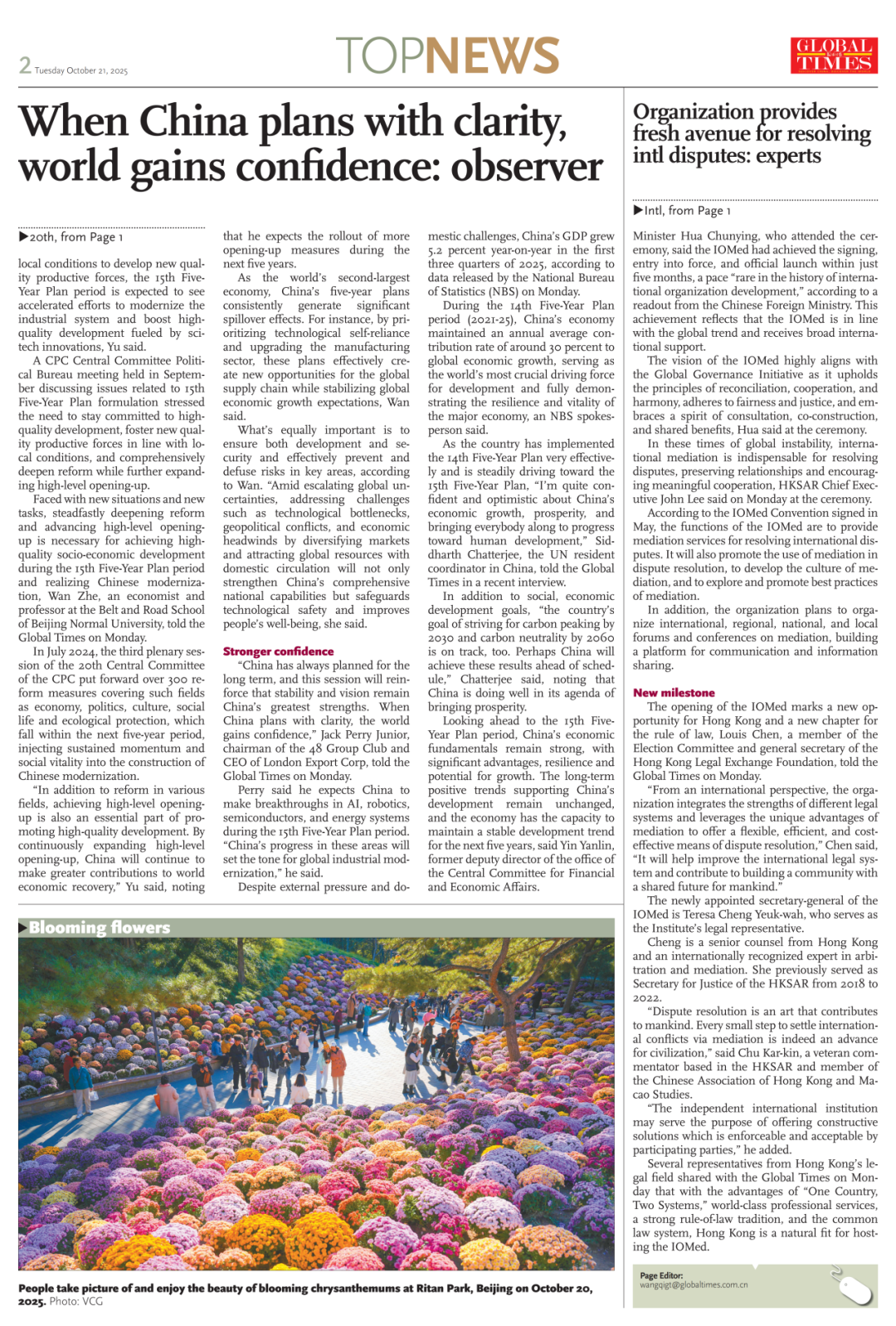近日,环球时报(GLOBAL TIMES)采访了全国人大代表,国际经济学会会士,辽宁大学党委副书记、校长余淼杰,现将原文转载如下:

20th CPC Central Committee starts fourth plenary session
The 20th Central Committee of the Communist Party of China (CPC) started its fourth plenary session in Beijing on Monday morning, the Xinhua News Agency reported.
Xi Jinping, general secretary of the CPC Central Committee, delivered a work report on behalf of the Political Bureau of the CPC Central Committee and expounded on the Party leadership's draft proposals for the formulation of the 15th Five-Year Plan (2026-30) for national economic and social development, according to Xinhua.
The much-awaited meeting has attracted wide attention, as how China formulates the country's next five-year plan not only carries exceptional weight for the country to basically achieve socialist modernization by 2035 but also injects valuable stability and certainty into the volatile world of today, experts said on Monday, expressing high expectations for the visionary roadmap.
Main themes in focus
Covering the 2026-30 period, a defining phase on China's path toward basically achieving socialist modernization by 2035, the plan is expected to be formulated through a comprehensive assessment of global trends and will serve as a blueprint for China's development in line with changing conditions, according to Xinhua.
Yu Miaojie, president of Liaoning University, told the Global Times on Monday that with the plan set for implementation next year, advancing Chinese modernization under the strong leadership of the CPC is poised to break new ground on all fronts.
Building on leveraging local conditions to develop new quality productive forces, the 15th Five-Year Plan period is expected to see accelerated efforts to modernize the industrial system and boost high-quality development fueled by sci-tech innovations, Yu said.
A CPC Central Committee Political Bureau meeting held on September 29 discussing issues related to 15th Five-Year Plan formulation stressed the need to stay committed to high-quality development, foster new quality productive forces in line with local conditions, and comprehensively deepen reform while further expanding high-level opening-up.
Faced with new situations and new tasks, steadfastly deepening reform and advancing high-level opening-up is necessary for achieving high-quality socio-economic development during the 15th Five-Year Plan period and realizing Chinese modernization, Wan Zhe, an economist and professor at the Belt and Road School of Beijing Normal University, told the Global Times on Monday.
In July 2024, the third plenary session of the 20th Central Committee of the CPC put forward over 300 reform measures covering such fields as economy, politics, culture, social life and ecological protection, which fall within the next five-year period, injecting sustained momentum and social vitality into the construction of Chinese modernization, according to Xinhua.
"In addition to reform in various fields, achieving high-level opening-up is also an essential part of promoting high-quality development. By continuously expanding high-level opening-up, China will continue to make greater contributions to world economic recovery," Yu said, noting that he expects the rollout of more opening-up measures during the next five years.
As the world's second-largest economy, China's five-year plans consistently generate significant spillover effects. For instance, by prioritizing technological self-reliance and upgrading the manufacturing sector, these plans effectively create new opportunities for the global supply chain while stabilizing global economic growth expectations, Wan said.
What's equally important is to ensure both development and security and effectively prevent and defuse risks in key areas, according to Wan. "Amid escalating global uncertainties, addressing challenges such as technological bottlenecks, geopolitical conflicts, and economic headwinds by diversifying markets and attracting global resources with domestic circulation will not only strengthen China's comprehensive national capabilities but safeguards technological safety and improves people's well-being, she said.
Stronger confidence
"China has always planned for the long term, and this session will reinforce that stability and vision remain China's greatest strengths. When China plans with clarity, the world gains confidence," Jack Perry Junior, chairman of the 48 Group Club and CEO of London Export Corp, told the Global Times on Monday.
Perry said he expects China to make breakthroughs in AI, robotics, semiconductors, and energy systems during the 15th Five-Year Plan period. "China's progress in these areas will set the tone for global industrial modernization," he said.
Despite external pressure and domestic challenges, China's GDP grew 5.2 percent year-on-year in the first three quarters of 2025, according to data released by the National Bureau of Statistics (NBS) on Monday.
During the 14th Five-Year Plan period (2021-25), China's economy maintained an annual average contribution rate of around 30 percent to global economic growth, serving as the world's most crucial driving force for development and fully demonstrating the resilience and vitality of the major economy, an NBS spokesperson said.
As the country has implemented the 14th Five-Year Plan very effectively and is steadily driving toward the 15th Five-Year Plan, "I'm quite confident and optimistic about China's economic growth, prosperity, and bringing everybody along to progress toward human development," Siddharth Chatterjee, the UN resident coordinator in China, told the Global Times in a recent interview.
In addition to social, economic development goal, "the country's goal of striving for carbon peaking by 2030 and carbon neutrality by 2060 is on track, too. Perhaps China will achieve these results ahead of schedule," Chatterjee said, noting that China is doing well in its agenda of bringing prosperity.
Looking ahead to the 15th Five-Year Plan period, China's economic fundamentals remain strong, with significant advantages, resilience and potential for growth. The long-term positive trends supporting China's development remain unchanged, and the economy has the capacity to maintain a stable development trend for the next five years, Yin Yanlin, former deputy director of the office of the Central Committee for Financial and Economic Affairs, told the Global Times on Monday.
The institutional advantages of socialism with Chinese characteristics, the advantages of an ultra-large domestic market, a complete industrial system, and abundant human resources are becoming even more evident. "Thus, I have full confidence in China's social and economic development for the 2026-30 period," Yin said.

